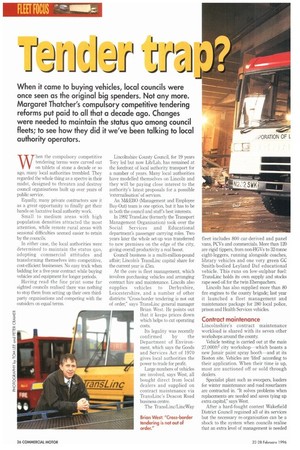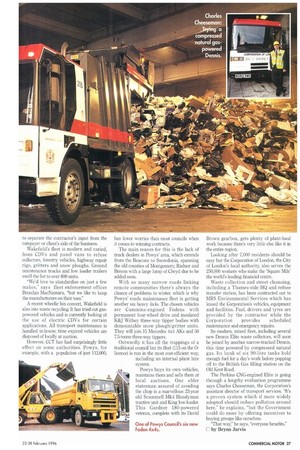When it came to buying vehicles, local councils were once
Page 28

Page 29

If you've noticed an error in this article please click here to report it so we can fix it.
seen as the original big spenders. Not any more. Margaret Thatcher's compulsory competitive tendering reforms put paid to all that a decade ago. Changes were needed to maintain the status quo among council fleets; to see how they did it we've been talking to local authority operators.
When the compulsory competitive tendering terms were carved out on tablets of stone a decade or so ago, many local authorities trembled. They regarded the whole thing as a spectre in their midst, designed to threaten and destroy council organisations built up over years of public service.
Equally, many private contractors saw it as a great opportunity to finally get their hands on lucrative local authority work.
Small to medium areas with high population densities attracted the most attention, while remote rural areas with seasonal difficulties seemed easier to retain by the councils.
In either case, the local authorities were determined to maintain the status quo, adopting commercial attitudes and transforming themselves into competitive, cost-efficient businesses. No easy trick when bidding for a five-year contract while buying vehicles and equipment for longer periods.
Having read the fine print some far sighted councils realised there was nothing to stop them from setting up their own thirdparty organisations and competing with the outsiders on equal terms. Lincolnshire County Council, for 19 years Tory led but now Lib/Lab, has remained at the forefront of local authority transport for a number of years. Many local authorities have modelled themselves on Lincoln and they will be paying close interest to the authority's latest proposals for a possible 'externalisation' of services.
An M&EI30 (Management and Employee Buy-Out) team is one option, but it has to be in both the council and staff's best interests.
In 1992 TransLinc (formerly the Transport Management Organisation) took over the Social Services and Educational department's passenger carrying roles. Two years later the whole set-up was transferred to new premises on the edge of the city, giving overall productivity a real boost.
Council business is a multi-million-pound affair; Lincoln's TransLinc capital share for the current year is £5m.
At the core is fleet management, which involves purchasing vehicles and arranging contract hire and maintenance. Lincoln also supplies vehicles to Derbyshire, Leicestershire, and a number of other districts: "Cross-border tendering is not out of order," says TransLinc general manager Brian West. He points out that it keeps prices down which helps to cut operating costs.
Its legality was recently confirmed by the Department of Environment, which says the Goods and Services Act of 1970 gives local authorities the power to trade for profit.
Large numbers of vehicles are involved, says West, all bought direct from local dealers and supplied on contract maintenance via TransLine's Deacon Road business centre.
The TransLinc/LincWay fleet includes 800 car-derived and panel vans, PCVs and commercials. More than 120 are rigid tippers, from non-HGVs to 32-tonne eight-leggers, running alongside coaches, library vehicles and one very green GC Smith-bodied Leyland Daf educational vehicle. This runs on low-sulphur fuel: TransLinc holds its own supply and stocks rape seed oil for the twin Eberspachers..
Lincoln has also supplied more than 80 fire engines to the county brigade; last year it launched a fleet management and maintenance package for 280 local police, prison and Health Services vehicles.
Contract maintenance
Lincolnshire's contract maintenance workload is shared with its seven other workshops around the county.
Vehicle testing is carried out at the main 27,000ft2 city workshop—which boasts a
new junair paint spray booth and at its Boston site. Vehicles are 'lifed' according to their application. When their time is up, most are auctioned off or sold through dealers.
Specialist plant such as sweepers, loaders for winter maintenance and road resurfacers are contracted in. "It solves problems when replacements are needed and saves tying up extra capital," says West.
After a hard-fought contest Wakefield District Council regained all of its services but the necessary re-organisation can be a shock to the system when councils realise that an extra level of management is needed to separate the contractor's input from the ratepayer or client's side of the business.
Wakefield's fleet is modern and varied, from CDVs and panel vans to refuse collectors, forestry vehicles, highway repair rigs, gritters and snow ploughs. Ground maintenance trucks and low loader trailers swell the list to over 800 units.
"We'd love to standardise on just a few makes," says fleet enforcement officer Brendan MacNamara, but we like to keep the manufacturers on their toes."
A recent wheelie bin convert, Wakefield is also into waste recycling. It has tried out gaspowered vehicles and is currently looking at the use of electric CDVs for certain applications. All transport maintenance is handled in-house; time expired vehicles are disposed of locally at auction, However, CCT has had surprisingly little effect on some authorities. Powys, for example, with a population of just 112,000, has fewer worries than most councils when it comes to winning contracts.
The main reason for this is the lack of truck dealers in POWyS' area, which extends from the Beacons to Snowdonia, spanning the old counties of Montgomery, Radnor and Brecon with a large lump of Clwyd due to be added soon.
With so many narrow roads linking remote communities there's always the chance of problems in winter, which is why Powys' roads maintenance fleet is getting another six heavy 4x4s. The chosen vehicles are Cummins-engined Fodens with permanent four-wheel drive and insulated K&J ViTithey three-way tipper bodies with demountable snow plough/gritter units. They will join 15 Mercedes 4x4 AKs and 50 7.5-tonne three-way tippers, Outwardly it has all the trappings of a traditional council but its fleet (115 on the 0licence is run in the most cost-efficient way, including an internal plant hire system.
Powys buys its own vehicles, maintains them and sells them at local auctions. One elder statesman assured of avoiding the chop is a marvellous 23-year old Scammell Mk4 Handyman tractive unit and King low-loader, This Gardner 180-powered veteran, complete with its David Brown gearbox, gets plenty of plant-haul work because there's very little else like it in the entire region.
Looking after 7,000 residents should be easy but the Corporation of London, the City of London's local authority, also serves the 250,000 workers who make the 'Square Mile' the world's leading financial centre.
Waste collection and street cleansing, including a Thames-side HQ and refuse transfer station, has been contracted out to MRS Environmental Services which has leased the Corporation's vehicles, equipment and facilities. Fuel, drivers and tyres are provided by the contractor while the Corporation provides scheduled maintenance and emergency repairs.
Its modern, mixed fleet, including several new Dennis Elite waste collectors, will soon be joined by another narrow-tracked Dennis, this time powered by compressed natural gas. Its bank of six 90-litre tanks hold enough fuel for a day's work before popping off to the British Gas filling station on the Old Kent Road.
The Perkins CNG-engined Elite is going through a lengthy evaluation programme says Charles Cheeseman, the Corporation's assistant director of transport services. "It's a proven system which if more widely adopted should reduce pollution around here," he explains, ''but the Government could do more by offering incentives to buying groups like ourselves.
"That way," he says, "everyone benefits." F by Bryan Jarvis




































































































